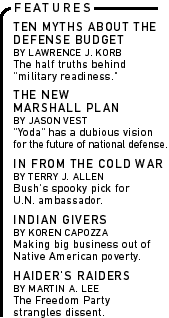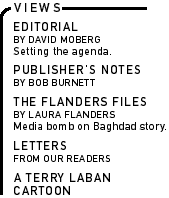

|

|

|

|
| |
|
|
|
On June 27, 1993, Bill Clinton ordered a bombardment of Baghdad. The next day he walked into church and said, "I feel quite good about what has transpired, and I think the American people should feel good about it." In fact, many Americans didn't feel so good, and their fury grew as U.S. newspapers revealed the names and, in some cases, the faces of the Iraqis whom U.S. bombs had wounded and killed. The Los Angeles Times, for example, described Clinton's raid on Baghdad's Harthiya district, "a modest, palm-lined neighborhood that is home to shopkeepers, civil servants and private traders," and told readers about Leila Attar, Iraq's best-known female artist, who was killed by a stray U.S. missile that hit her home, killing her, her husband and their maid in their sleep. Eight years and several thousand airstrikes later, George W. Bush approved more bombing near Baghdad. This time the press gave us not one name or face, save that of Dubya, with his garbled explanation for the attack: "Saddam Hussein has got to understand that we expect him to conform to the agreement that he signed after Desert Storm. We will enforce the no-fly zone both south and north. Our intention is to make sure the world is as peaceful as possible, and we're going to watch very carefully as to whether or not he develops weapons of mass destruction." The New York Times ran four articles the day after the bombing, not one voicing a word of complaint. The lead editorial called the airstrikes "justified" and "timely;" the facing op-ed by Anthony Cordesman, a hawk with the Center for Strategic and International Studies, was headlined "No Choice But to Strike." As for fatalities, instead of doing their own reporting, the Times simply repeated the words of unnamed officials: "Iraqi television said numerous civilians had been wounded in the attacks. ... Pentagon officials said they had no evidence of civilian casualties." Iraqi TV reported three deaths and more than a dozen wounded. Indeed, the U.S. media have as yet to assign one reporter to visit Iraqi hospitals to check out the government reports. Had the New York Times and others permitted critics to be heard, they would have made the point that Bush is lying or at best misleading the public. The so-called "no-fly zones" are not part of any cease-fire treaty, nor are they part of any U.N. resolution. Ever since the first Bush administration imposed the zones in 1991, U.S. presidents have claimed that their purpose is to protect Iraqi and Kurdish civilians from abuse at Saddam Hussein's hands. But the United States has done nothing to protect the Kurds from attack by U.S. ally Turkey (whose forces invade northern Iraq every spring in pursuit of Kurdish separatists). No, the only purpose of these flights is to keep Iraqi planes out of two-thirds of Iraq's airspace. And such a critic would have made the obvious point: Who is provoking whom? The zones are illegal under international law, it's just that no one has the power to stop them. Since 1996, Saddam has ordered Iraqi gunmen to fire back, in part because of attacks from critics (including his son) who think (after 10 years of sanctions and bombing) that Saddam has gone soft on the West. Are Iraqi defenses getting better, as the Defense Department asserts? Perhaps. But no U.S. plane has ever been hit; meanwhile, the Iraqis claim some 323 people have been killed and 957 wounded by Allied air strikes. As for mass destruction, the U.S. and British actions have only encouraged it. U.N. weapons inspectors had to be pulled out of Iraq before Clinton's December 1998 assault, and not one has ever been back. The Times also denied its readers the facts about how U.S. policy toward Iraq is harming U.S. relations overseas. NATO allies France, Italy and Germany condemned the airstrikes, as did U.N. Security Council members China and Russia. Most of the countries the U.S. claims to protect with its policy toward Iraq were against the attack, including Turkey, Jordan and Saudi Arabia. Egypt, declared the airstrikes "unacceptable." The policy of isolating Iraq is bankrupt. A variety of European countries have violated the no-fly edict and want an end to the sanctions. In January, Syria and Egypt signed a free trade pact with Iraq and committed to closer travel and trading links. Baghdad is already Cairo's top export market after the United States, and Iraqi oil is "leaking" through Iran despite sanctions. Do the U.S. media tell U.S. taxpayers, who pay for the program, that it's kaput? Absolutely not. Instead the Times, reporting on Secretary of State Colin Powell's visit abroad, declared that he had "won agreement from Arab nations on a plan to modify sanctions." Actually, Powell had succumbed just a tiny bit to massive pressure from the vast majority of nations who have had enough of the U.S. program of starve and strafe. When the Washington Post revealed on February 22 that most
of the bombs dropped by U.S. warplanes missed their mark, no one
seems to have posed the question--where did the bombs hit--or
whom? The U.S. public, it turns out, have neither the means
to ask, nor the right to know. Luckily, media censorship is not
stopping U.S. organizing. On February 18, representatives of more
than 60 peace and justice groups formed a new coalition to challenge
U.S. policy, the National Network to End the War Against Iraq (www.ccmep.org/Conference/conference.html).
|

